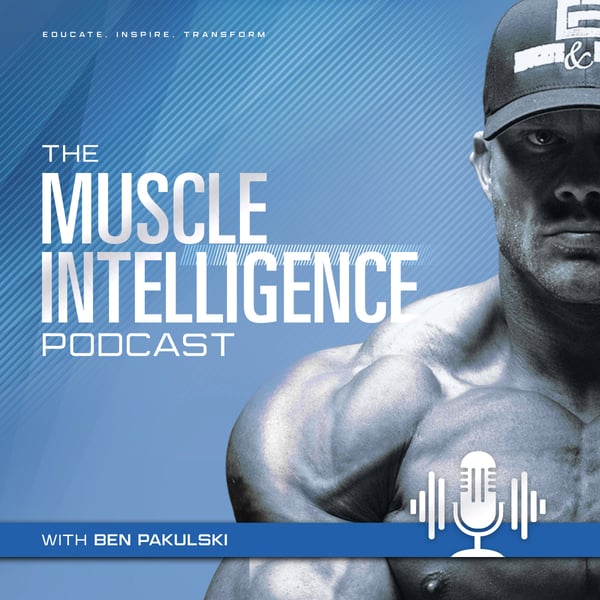The Science of Sleep (and Why You Need to Pay Attention) with Tara Youngblood
Muscle Intelligence
Ben Pakulski
4.8 • 745 Ratings
🗓️ 13 November 2019
⏱️ 43 minutes
🧾️ Download transcript
Summary
In this episode of the Muscle Intelligence Podcast, we are joined by sleep expert and co-founder of Chili Technology, Tara Youngblood! She is here to discuss everything sleep-related and how we can make the most of this all-important part of our lives. Tara gives us some great insight into the most important factors that influence our sleep and emphasizes the unique ways our bodies work in relation to rest and recovery. Our chronotype determines a lot of how our bodies prepare and enter into a sleep cycle and so there is no one-size-fits-all remedy for inferior sleep. Rather, we need to look at our indicators and respond accordingly to these to optimize sleep for better health. We discuss body fat, stress, diet, temperature, supplementation and more! For Tara, the exercise is to build awareness and knowledge of one's own profile and then build healthy practices and habits that promote better sleep with steady REM periods. This episode is brought to you by the best olive oil in the world! Fresh Pressed Olive is still offering bottles for $1 so go straight to getfresh35.com to order yours!
Timestamps
- Surprising correlations between body fat and temperature during sleep. [5:13]
- Minimizing stress for your sleep space and maximizing recovery. [6:14]
- Good sleep habits that can make traveling easier on your body. [10:30]
- Starting with your chronotype and timing your day accordingly. [11:15]
- The huge influence of temperature in preparing our bodies to sleep. [15:15]
- Influential factors on attaining more time in deep sleep. [19:13]
- Habits and hacks to implement before bedtime to boost your recovery. [21:28]
- The deterioration of deep sleep in older persons and reasons for this. [24:47]
- The relationship between diet, metabolism and circadian rhythms. [27:50]
- Tara's upcoming TEDtalk and the 'three buckets of sleep'. [29:34]
- Supplementation for sleep and unique approaches for type. [32:39]
- Journalling and tracking sleep for better awareness. [37:09]
Transcript
Click on a timestamp to play from that location
| 0:00.0 | Hey everybody. Welcome to the Muscle Intelligence Podcast. I hope everyone is having an absolutely fantastic day. |
| 0:22.6 | I hope you're full of energy, slept like a champion last night, and you're attacking your goals in life every single day. |
| 0:29.6 | I'm having a great day. I'm actually in the process of designing all the camp material for Australia, New Zealand and Dubai, |
| 0:36.6 | and I look forward to seeing each and every one of |
| 0:38.1 | you there. If you're able to make it, this is going to be all brand new material, and I'm super |
| 0:42.2 | pumped about it. Today's guest is actually going to be filling us in on one of the topics I'm |
| 0:47.0 | going to be talking about in the camps, and that sleep, sleep for a long time was something that I |
| 0:52.2 | neglected. I think a lot of young, motivated individuals tend to neglect sleep |
| 0:58.8 | and wear it as a badge of honor as though it doesn't matter and I'll sleep when I'm dead. |
| 1:03.5 | It was definitely a mentality that I took on for the better part of 10 years. |
| 1:08.0 | I overcame it with pre-workout stimulants. |
| 1:10.8 | I overcame it with coffee. And I overcame it with pre-workout stimulants. I overcame it with coffee. |
| 1:12.7 | And I overcame it with just sheer will many times. |
| 1:16.7 | And I will advise you that that is not the best way to approach life. |
| 1:22.3 | That is not the best way to approach performance. |
| 1:25.3 | Because at 37 years old, I had telomeres that were the length |
| 1:31.0 | of a 51-year-old person, which means telomeres, for those of you they don't know, are the |
| 1:35.4 | little ends of your DNA strands that indicate how long your life is. The short of the telomere, |
| 1:41.6 | the less amount of time you have remitting in your life. |
| 1:50.5 | So, interestingly enough, after re-implementing some sleep strategies, my telomeres are now back to the level of what they're supposed to be and actually looks like they're trending to be |
| 1:55.1 | younger than my current age of 38 years old. And all I did was change sleep. And I went from sleeping five hours |
| 2:01.9 | a night to between seven and eight every night. Not only is it long sleep, it's also high quality |
... |
Please login to see the full transcript.
Disclaimer: The podcast and artwork embedded on this page are from Ben Pakulski, and are the property of its owner and not affiliated with or endorsed by Tapesearch.
Generated transcripts are the property of Ben Pakulski and are distributed freely under the Fair Use doctrine. Transcripts generated by Tapesearch are not guaranteed to be accurate.
Copyright © Tapesearch 2025.

